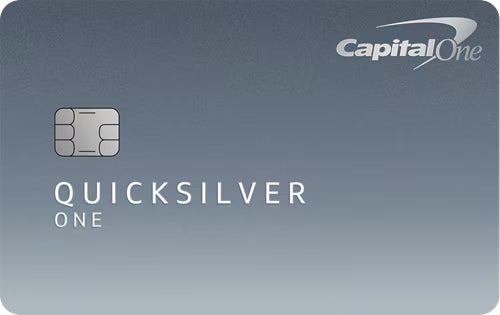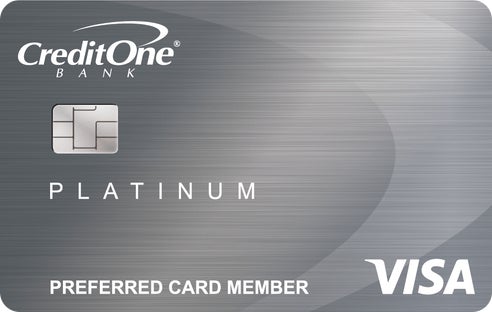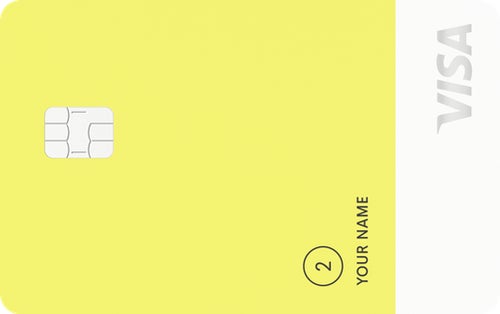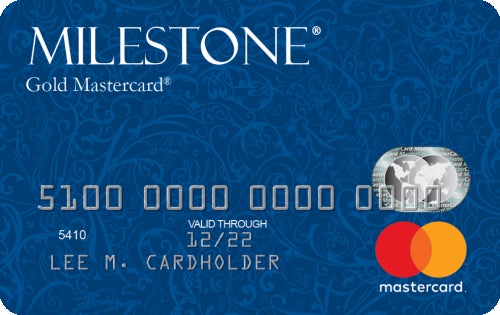| Credit Building Rating: | 1.7 / 5 |
| Cost of Membership | 1.0 |
| Ease of Building Credit | 2.9 |
| APR | 2.4 |
| Features | 1.0 |
In a Nutshell:
Though it could be useful if you want to build credit without putting down a security deposit, the Milestone Mastercard’s high annual fee, high APR and bare-bones cardholder perks make it hard to recommend for most cardholders.
Average Cost of Membership Per Year $91
|  |
Security Deposit Required $0 |  |
Initial Credit Limit $300 |  |
Access to Higher Credit Line? Not specified |  |
APR See Terms |  |
Annual Fee $35-$99 |  |
Other Rates and Fees
|  |
Rewards None |  |
Other Notable Features: Identity theft protection, $0 liability for unauthorized transactions
Opening a new credit card is an important step as you work to repair bad credit, but knowing where to start can be a challenge. Since many cards designed to help people rebuild their credit history – especially unsecured credit-building cards – come loaded with heavy fees and restrictions, the wrong choice could leave you in worse financial shape than when you started.
Viewed through this lens, the Milestone Mastercard is a mixed bag. Though the card carries a high annual fee, high APR, low credit limit and next to nothing in the way of cardholder perks, it requires no deposit, offers good approval odds and comes with relatively straightforward terms.
You’ll almost certainly be better off applying for a secured credit card that charges no annual fee – but the Milestone Mastercard could make sense as a credit-building tool if you’re diligent about paying off your balance and view the card as merely a stepping stone to better options down the line.
See related: How to build credit
High annual fee for some cardholders
Like nearly all unsecured credit-building cards, the Milestone Mastercard carries an annual fee. Depending on your credit history, you’ll pay between $35 and $75 in your first year just to hold the card (if you’re assigned the high-end annual fee, this will increase to $99 in your second year). What’s worse, you won’t know where in that range your annual fee falls before you apply.
While this is fairly pricey, especially given the card’s limited perks, it’s on par with the rate you’ll find on many unsecured cards designed for people with poor credit.
Indeed, if you’re lucky enough to qualify, the card’s low-end annual fee is reasonable compared to many unsecured credit-building alternatives. For example, the Reflex® Platinum Mastercard® charges an annual fee of $75 to $125, plus additional monthly fees after your first year.
On the other hand, a number of secured cards charge lower fees or no annual fee at all. For example, the opensky® Secured Visa® Credit Card guarantees all cardholders a $35 annual fee, with no credit check required. The Discover it® Secured Credit Card and the Capital One Platinum Secured Credit Card, meanwhile, charge no annual fee at all.
The tradeoff is that these cards require a security deposit. If that’s something you’d rather avoid, you could look at the Milestone Mastercard’s annual fee as simply the short-term cost of building credit with an unsecured card.
| Tip: Unlike an annual fee, any deposit you put down on a secured card is refundable. If you pay off your balance and have no outstanding fees, you can get your money back when you close the account or graduate to an unsecured card from the same issuer. |
Low starting credit limit
Along with hefty fees, one of the main downsides of unsecured credit-building cards is that they tend to offer lower credit limits.
The Milestone Mastercard is no exception. The card carries a standard starting credit limit of $300, and your annual fee is immediately deducted from your available credit. This means that if you are assigned the high-end annual fee of $75 in your first year, you will start off with a $75 balance and around $225 in available credit.
While this limit is relatively common for unsecured credit-building cards, it could be a stumbling block for many users. That’s because a low credit limit makes it difficult to maintain a low credit utilization ratio (the amount of money you’ve borrowed relative to your total available credit).
Your credit utilization ratio makes up 30% of your credit score, and many financial experts recommend keeping your credit utilization below 30% if you want to improve your credit score. With only a $300 credit limit, it won’t take much to reach a high credit utilization ratio if you use your card for everyday purchases.
Plus, the Milestone Mastercard does not offer any standard timeline for getting a credit limit increase. A number of other credit-building cards automatically review your account for a higher credit limit after a few months of on-time payments.
High APR
The Milestone Mastercard charges all cardholders the same APR of 24.90%, regardless of credit history. While a non-variable APR is a nice perk given that most cards charge a variable APR, the Milestone Mastercard’s rate is very high compared to the average credit card APR. It’s even a bit higher than the average APR on a card designed for someone with bad credit.
To avoid hefty interest charges, consider using the card only for small purchases (like a single subscription service) that you know you can pay off quickly. This will also help you build positive payment history and maintain low credit utilization.
| Tip: If you fear a credit card could lead you to spend more than you can pay back, consider a low-interest credit-building tool like a credit-builder loan. |
No rewards program and few perks
Another downside of the Milestone Mastercard is that it does not offer any sort of rewards program that could help offset its cost of ownership.
While it’s by no means common, a number of credit-building cards offer cash back on some everyday spending, including many unsecured cards from Credit One Bank and secured cards from Discover and Capital One.
The Milestone Mastercard also falls far short when it comes to cardholder perks. As part of the card’s Mastercard benefits, you’ll get identity theft protection and will not be held responsible for unauthorized transactions. But you won’t even get free credit score access – a major shortcoming for a card ostensibly designed to help build credit.
Approval odds
One of the main appeals of the Milestone Mastercard is that it offers a low entry barrier: The card is open to applicants of all credit levels, including those with no credit history. It’s even marketed as a good option for people looking for a credit card after bankruptcy.
You can prequalify for the card online or try out the CreditCards.com CardMatch tool to see if it’s a match. In either case, only a soft pull of your credit is required and you’ll get a much better sense of your odds of approval.
See related: What does ‘prequalified’ mean for a credit card?
How does the Milestone Mastercard compare to other credit-building cards?
The Milestone Mastercard requires no deposit upfront and is well within reach if you have damaged credit, but it’s far from your only credit-building option. Consider these alternatives – all unsecured cards that can help build credit, potentially at a lower cost:
 |  |  |
Rewards rate
| Rewards rate
| Rewards rate
|
| Credit limit See terms | Credit limit Starting at $300 | Credit limit $300-$10,000 |
| Annual fee $39 | Annual fee $75 for the first year. After that, $99 annually ($8.25 per month) | Annual fee $0 |
Other things to know
| Other things to know
| Other things to know
|
Capital One QuicksilverOne Credit Card
Designed for cardholders with fair credit or higher (a credit score of 580-plus), the Capital One QuicksilverOne card offers unlimited 1.5% cash back on every purchase, which should help offset the card’s $39 annual fee. You’ll also have a chance at a credit limit increase if you make six consecutive on-time payments.
Credit One Bank® Platinum Visa® for Rebuilding Credit
Though the Credit One Bank Platinum Visa for Rebuilding Credit also charges an annual fee, it at least offers a decent cash back rewards program. You’ll earn 1% cash back rewards on eligible everyday purchases like gas, groceries and phone services, which should help you bring down the card’s cost a bit. You can also prequalify for the card and see your offer before you move forward.
See related: Credit One vs. Capital One
Petal 2 Visa Credit Card
Designed to help those with a limited credit history (as opposed to a negative credit history), the Petal 2 Visa Credit Card charges no fees of any kind and does not require a security deposit. You’ll earn 1% cash back on eligible purchases and can boost that rate to 1.5% after 12 on-time monthly payments. The card’s issuer may also consider factors like your income and bill payment history when making approval decisions – not just your credit score.
Why get the Milestone Mastercard?
- You want to build credit without putting down a security deposit.
- You want a card that offers prequalification and good approval odds.
- You have a poor credit score or a recent bankruptcy.
How to use the Milestone Mastercard
- Maintain low credit utilization by only using the card for small purchases you know you can pay off quickly.
- Pay off your balance on time and in full each month to build positive payment history and avoid hefty interest charges.
- Monitor your credit score using a free tool like Credit Journey, and consider switching to a card with a lower cost of ownership once your score improves.
Is the Milestone Mastercard worth it?
While it’s not the worst unsecured credit-building card on the market, the Milestone Mastercard fails to impress due to its high cost, high APR, low credit limit and anemic perks. The card may do the job as a temporary credit-building tool, but a no-annual-fee secured card will be a better for most.
*All information about the Milestone® Gold Mastercard® and Credit One Bank Platinum Visa for Rebuilding Credit card has been collected independently by CreditCards.com. The issuer did not provide the content, nor is it responsible for its accuracy.
About the author
All reviews are prepared by CreditCards.com staff. Opinions expressed therein are solely those of the reviewer and have not been reviewed or approved by any advertiser. The information, including card rates and fees, presented in the review is accurate as of the date of the review. Check the data at the top of this page and the bank’s website for the most current information.
Responses to comments in the discussion section below are not provided, reviewed, approved, endorsed or commissioned by our financial partners. It is not our partner’s responsibility to ensure all posts or questions are answered.
